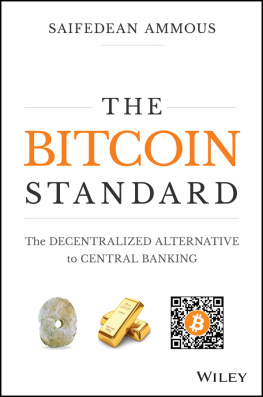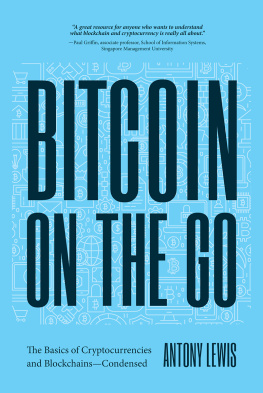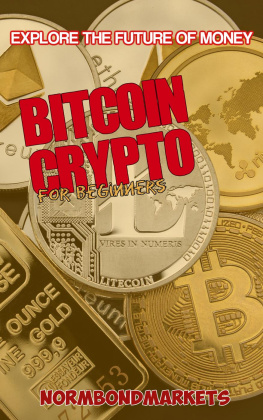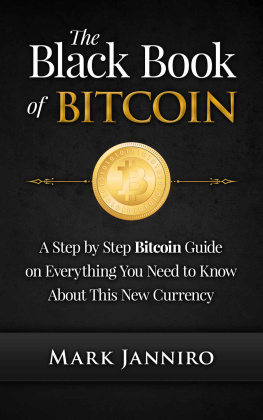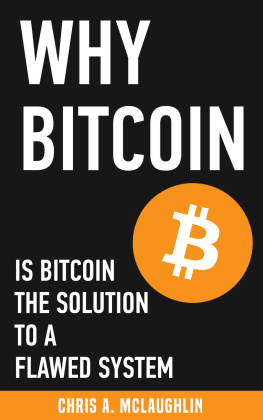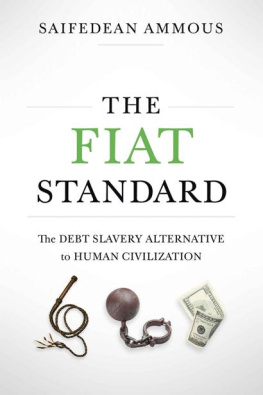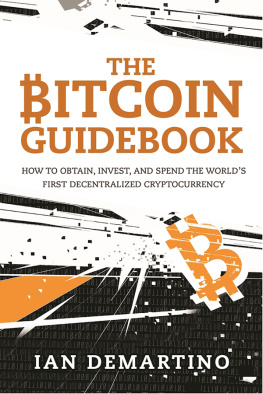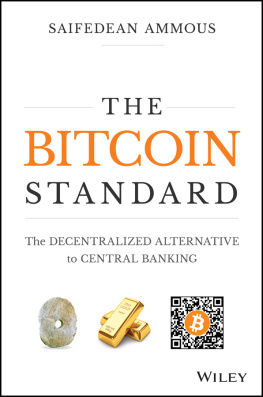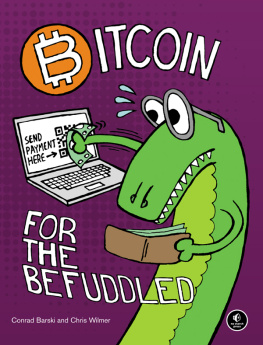Ammous - The Bitcoin Standard
Here you can read online Ammous - The Bitcoin Standard full text of the book (entire story) in english for free. Download pdf and epub, get meaning, cover and reviews about this ebook. year: 2018, publisher: John Wiley & Sons, Incorporated, genre: Home and family. Description of the work, (preface) as well as reviews are available. Best literature library LitArk.com created for fans of good reading and offers a wide selection of genres:
Romance novel
Science fiction
Adventure
Detective
Science
History
Home and family
Prose
Art
Politics
Computer
Non-fiction
Religion
Business
Children
Humor
Choose a favorite category and find really read worthwhile books. Enjoy immersion in the world of imagination, feel the emotions of the characters or learn something new for yourself, make an fascinating discovery.
- Book:The Bitcoin Standard
- Author:
- Publisher:John Wiley & Sons, Incorporated
- Genre:
- Year:2018
- Rating:4 / 5
- Favourites:Add to favourites
- Your mark:
- 80
- 1
- 2
- 3
- 4
- 5
The Bitcoin Standard: summary, description and annotation
We offer to read an annotation, description, summary or preface (depends on what the author of the book "The Bitcoin Standard" wrote himself). If you haven't found the necessary information about the book — write in the comments, we will try to find it.
The Bitcoin Standard — read online for free the complete book (whole text) full work
Below is the text of the book, divided by pages. System saving the place of the last page read, allows you to conveniently read the book "The Bitcoin Standard" online for free, without having to search again every time where you left off. Put a bookmark, and you can go to the page where you finished reading at any time.
Font size:
Interval:
Bookmark:

- Chapter 3
- Chapter 4
- Chapter 7
- Chapter 8
- Chapter 3
- Chapter 4
- Chapter 5
- Chapter 6
- Chapter 8
- Chapter 9
- Chapter 10
Saifedean Ammous

Copyright 2018 by Saifedean Ammous. All rights reserved.
Published by John Wiley & Sons, Inc., Hoboken, New Jersey.
Published simultaneously in Canada.
No part of this publication may be reproduced, stored in a retrieval system, or transmitted in any form or by any means, electronic, mechanical, photocopying, recording, scanning, or otherwise, except as permitted under Section 107 or 108 of the 1976 United States Copyright Act, without either the prior written permission of the Publisher, or authorization through payment of the appropriate percopy fee to the Copyright Clearance Center, Inc., 222 Rosewood Drive, Danvers, MA 01923, (978) 7508400, fax (978) 6468600, or on the Web at www.copyright.com. Requests to the Publisher for permission should be addressed to the Permissions Department, John Wiley & Sons, Inc., 111 River Street, Hoboken, NJ 07030, (201) 7486011, fax (201) 7486008, or online at www.wiley.com/go/permissions.
Limit of Liability/Disclaimer of Warranty: While the publisher and author have used their best efforts in preparing this book, they make no representations or warranties with respect to the accuracy or completeness of the contents of this book and specifically disclaim any implied warranties of merchantability or fitness for a particular purpose. No warranty may be created or extended by sales representatives or written sales materials. The advice and strategies contained herein may not be suitable for your situation. You should consult with a professional where appropriate. Neither the publisher nor author shall be liable for any loss of profit or any other commercial damages, including but not limited to special, incidental, consequential, or other damages.
For general information on our other products and services or for technical support, please contact our Customer Care Department within the United States at (800) 7622974, outside the United States at (317) 5723993, or fax (317) 5724002.
Wiley publishes in a variety of print and electronic formats and by printondemand. Some material included with standard print versions of this book may not be included in ebooks or in printondemand. If this book refers to media such as a CD or DVD that is not included in the version you purchased, you may download this material at http://booksupport.wiley.com. For more information about Wiley products, visit www.wiley.com.
Library of Congress CataloginginPublication Data is Available:
ISBN 9781119473862 (Hardcover)
ISBN 9781119473893 (ePDF)
ISBN 9781119473916 (ePub)
Cover Design: Wiley
Cover Images: REI stone Danita Delimont/Getty Images; gold bars Grassetto/Getty Images; QR code/Courtesy of Saifedean Ammous
To my wife and daughter, who give me a reason to write.
And to Satoshi Nakamoto, who gave me something worth writing about.
Saifedean Ammous is a Professor of Economics at the Lebanese American University and member of the Center on Capitalism and Society at Columbia University. He holds a PhD in Sustainable Development from Columbia University.
by Nassim Nicholas Taleb
Let us follow the logic of things from the beginning. Or, rather, from the end: modern times. We are, as I am writing these lines, witnessing a complete riot against some class of experts, in domains that are too difficult for us to understand, such as macroeconomic reality, and in which not only is the expert not an expert, but he doesn't know it. That previous Federal Reserve bosses Greenspan and Bernanke, had little grasp of empirical reality is something we only discovered too late: one can macroBS longer than microBS, which is why we need to be careful of whom to endow with centralized macro decisions.
What makes it worse is that all central banks operated under the same model, making it a perfect monoculture.
In complex domains, expertise doesn't concentrate: under organic reality, things work in a distributed way, as F. A. Hayek has convincingly demonstrated. But Hayek used the notion of distributed knowledge. Well, it looks like we do not even need the knowledge part for things to work well. Nor do we need individual rationality. All we need is structure.
It doesn't mean all participants have a democratic share in decisions. One motivated participant can disproportionately move the needle (what I have studied as the asymmetry of the minority rule). But every participant has the option to be that player.
Somehow, under scale transformation, a miraculous effect emerges: rational markets do not require any individual trader to be rational. In fact they work well under zero intelligencea zerointelligence crowd, under the right design, works better than a Sovietstyle management composed of maximally intelligent humans.
Which is why Bitcoin is an excellent idea. It fulfills the needs of the complex system, not because it is a cryptocurrency, but precisely because it has no owner, no authority that can decide on its fate. It is owned by the crowd, its users. And it now has a track record of several years, enough for it to be an animal in its own right.
For other cryptocurrencies to compete, they need to have such a Hayekian property.
Bitcoin is a currency without a government. But, one may ask, didn't we have gold, silver, and other metals, another class of currencies without a government? Not quite. When you trade gold, you trade loco Hong Kong and end up receiving a claim on a stock there, which you might need to move to New Jersey. Banks control the custodian game and governments control banks (or, rather, bankers and government officials are, to be polite, tight together). So Bitcoin has a huge advantage over gold in transactions: clearance does not require a specific custodian. No government can control what code you have in your head.
Finally, Bitcoin will go through hiccups. It may fail; but then it will be easily reinvented as we now know how it works. In its present state, it may not be convenient for transactions, not good enough to buy your decaffeinated espresso macchiato at your local virtuesignaling coffee chain. It may be too volatile to be a currency for now. But it is the first organic currency.
But its mere existence is an insurance policy that will remind governments that the last object the establishment could control, namely, the currency, is no longer their monopoly. This gives us, the crowd, an insurance policy against an Orwellian future.
Nassim Nicholas Taleb
January 22, 2018
On November 1, 2008, a computer programmer going by the pseudonym Satoshi Nakamoto sent an email to a cryptography mailing list to announce that he had produced a new electronic cash system that's fully peertopeer, with no trusted third party. He copied the abstract of the paper explaining the design, and a link to it online. In essence, Bitcoin offered a payment network with its own native currency, and used a sophisticated method for members to verify all transactions without having to trust in any single member of the network. The currency was issued at a predetermined rate to reward the members who spent their processing power on verifying the transactions, thus providing a reward for their work. The startling thing about this invention was that, contrary to many other previous attempts at setting up a digital cash, it actually worked.
Next pageFont size:
Interval:
Bookmark:
Similar books «The Bitcoin Standard»
Look at similar books to The Bitcoin Standard. We have selected literature similar in name and meaning in the hope of providing readers with more options to find new, interesting, not yet read works.
Discussion, reviews of the book The Bitcoin Standard and just readers' own opinions. Leave your comments, write what you think about the work, its meaning or the main characters. Specify what exactly you liked and what you didn't like, and why you think so.

